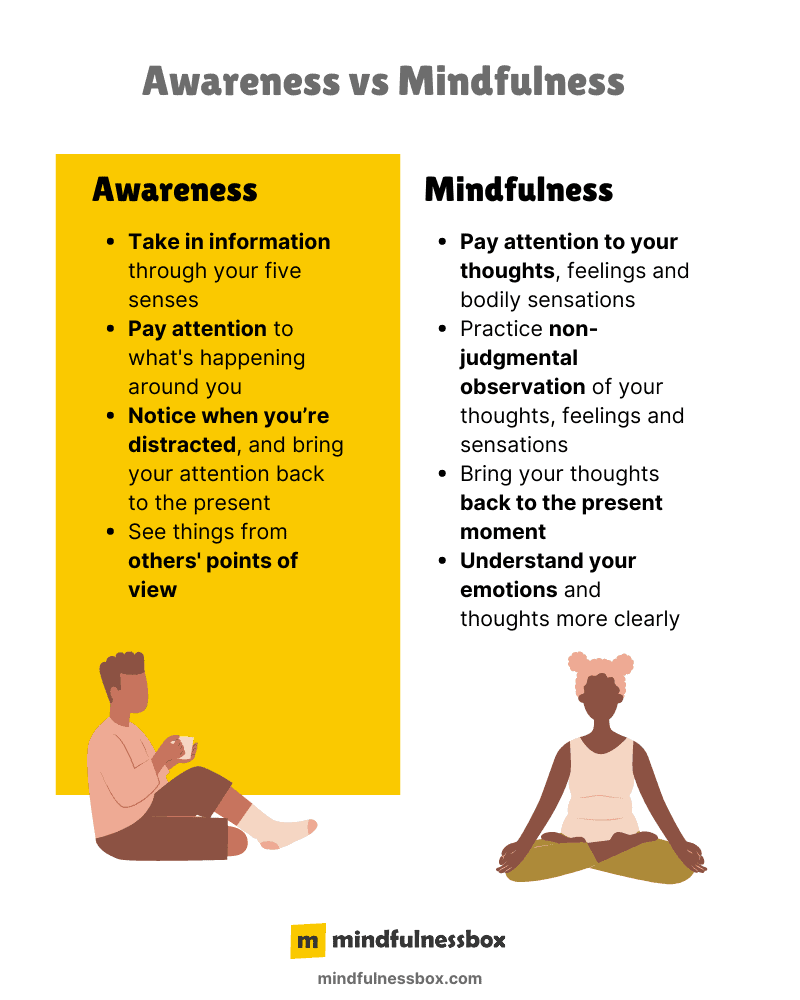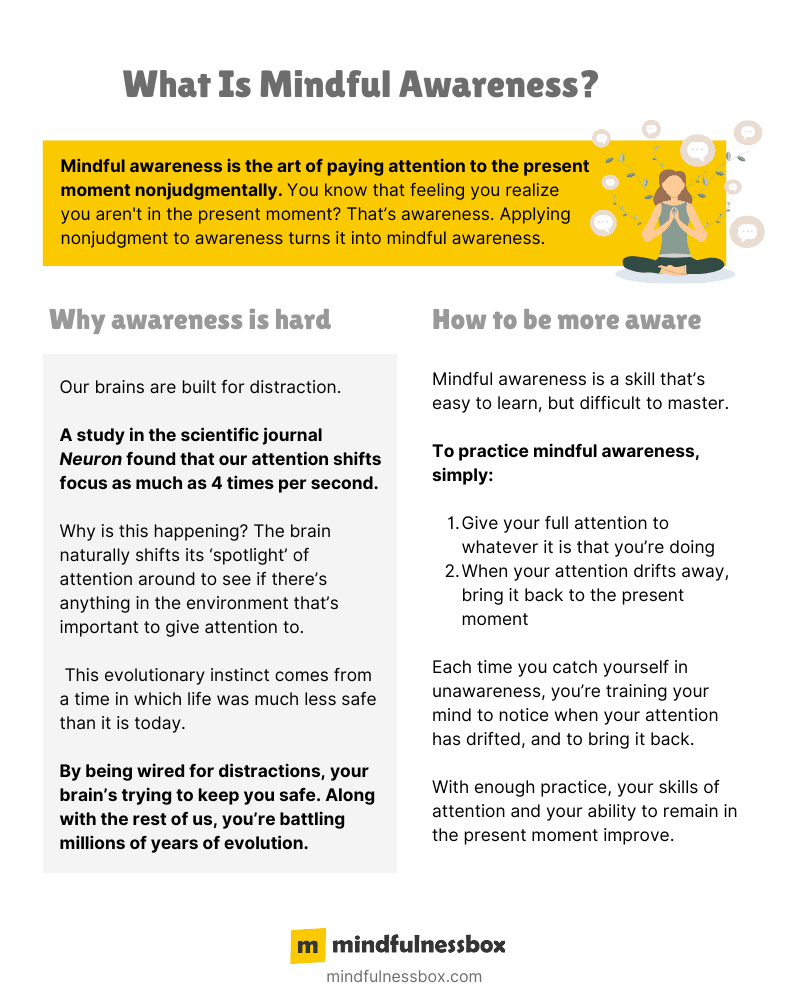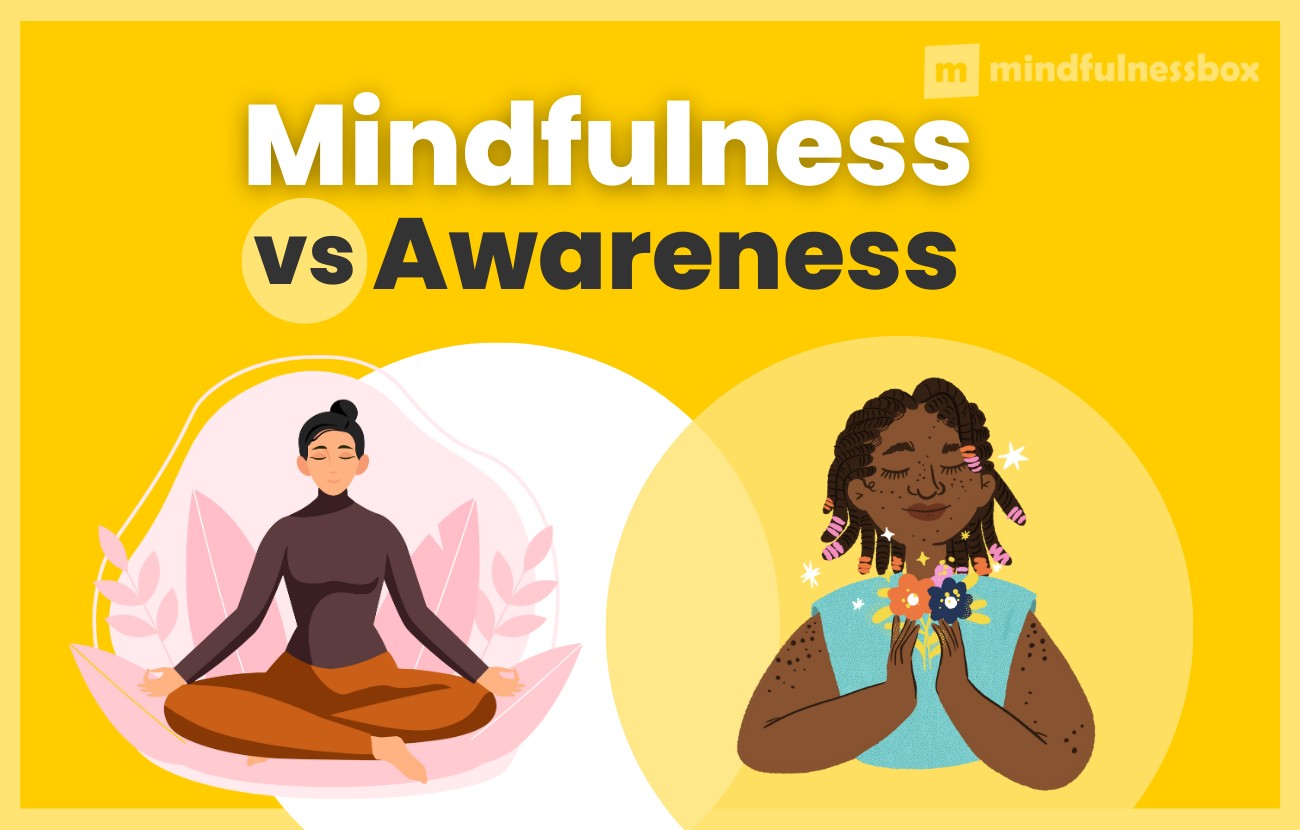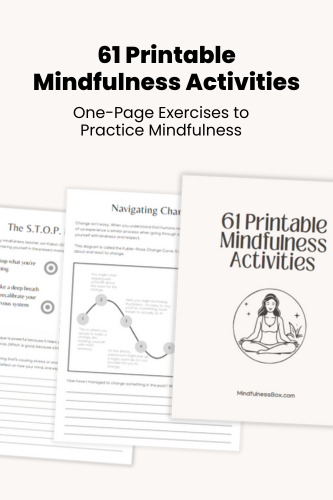Mindfulness vs awareness is a tricky concept to untangle. Both awareness and mindfulness involve observing your thoughts, emotions, and environments. The key difference between awareness and mindfulness is that mindfulness promotes nonjudgmental observation.
Mindfulness and awareness are two concepts that are easy to confuse.
While the two concepts are closely related, they’re not precisely the same.
Get dozens of one-page exercises to help practice mindfulness, meditation, gratitude, and self love. Perfect for printable handouts when teaching mindfulness to groups, students, or in the workplace.
To see examples, plus a full list of the 61 exercises included, click below.
When you’re meditating, or when you’re being mindful, you’re often training your awareness. To confuse matters further, some terms like “mindful awareness” actually do mean mindfulness.
Below, we’ll explore the differences and similarities between mindfulness and awareness, and how to think about the place each has in our lives.
What’s the difference between mindfulness and awareness?

So, how are mindfulness and awareness not exactly the same thing?
The main difference between mindfulness and awareness is that mindfulness has an inward focus and a focus on nonjudgment, whereas awareness focuses more on what’s happening in the environment around you and may or may not include judgment.
Awareness is about taking in information through all five senses (hearing, touch, sight, taste and smell) in addition to the information in your own mind. It covers the activities and sensations happening externally, in addition to the thoughts and feelings we’re having internally.
In some contexts, awareness may only refer to assessing the environment around you. This is often true when awareness is used in the context of physical safety.
Like awareness, mindfulness may also encompass activities external to us. But more often, mindfulness focuses on our inner lives, thoughts and emotions. And in all cases, mindfulness focuses on nonjudgement.
Here’s what the experts say

Jon Kabat-Zinn is one of the people most responsible for the growth of the mindfulness movement.
His original definition of mindfulness includes the term awareness:
“Mindfulness is the awareness that arises from paying attention on purpose in the present moment nonjudgmentally.”
Breaking this down, we see mostly similarities, but also differences. Primarily, it’s that awareness on its own isn’t inherently nonjudgmental.
Only when pulled into the context of mindfulness does awareness go from an “assessing” activity (assessing dangers, assessing peoples’ reactions, scanning the environment around you for clues) to a nonjudgmental activity.
Still, in Jon Kabat-Zinn’s words, it can be difficult to describe what mindfulness is:
“It’s hard to actually describe what mindfulness is and, of course, there are plenty of different definitions of it. Early on, I realized that it’s just a can of worms to try to give mindfulness a precise definition. I prefer to approach it not as a concept, but as an experience, a way of being, a doorway into oneself.”
Similarities between mindfulness and awareness
Of course, mindfulness and awareness are closely linked topics and have more similarities than differences.
Both mindfulness and awareness help us to live more fully in the moment by staying in tune with our present experience. Mindfulness allows us to be more aware of our thoughts, feelings and bodily sensations, while awareness expands on that by focusing on the environment around us. And when we’re able to focus on the present moment, we’re less likely to be caught up in worries about the past or future.
Both mindfulness and awareness also help us to live more compassionately. Mindfulness enables us to understand our emotions and thoughts more clearly, while awareness allows us to see things from others’ points of view by observing their reactions and intuiting their feelings. When we’re able to understand and see things from other people’s perspectives, we’re more likely to show compassion towards them.
Does mindfulness increase awareness?

Absolutely. Mindfulness and meditation are a training of our awareness skills, to help us stay focused on the present moment.
With practice, this enables us to be more aware of our thoughts, feelings and bodily sensations. When we’re mindfulness of these things, we’re less likely to be caught up in worries about the past or future. And when we’re more aware of what’s happening around us, we’re better able to take in information through our five senses.
Although mindfulness and awareness aren’t exactly the same, each is complementary to the other.
When you practice mindfulness, you:
- Pay attention to your thoughts, feelings and bodily sensations
- Practice non-judgmental observation of your thoughts, feelings and sensations
- Bring your thoughts back to the present moment
- Understand your emotions and thoughts more clearly
When you practice awareness, you:
- Take in information through your five senses
- Pay attention to what’s happening in the environment around you
- Notice when you’re distracted, and bring your attention back to the present
- See things from others’ points of view
What is mindful awareness?
Mindful awareness is sometimes used as a synonym for mindfulness.
According to the United States Veterans’ Administration, for example, “mindful awareness helps you to be aware of thoughts and feelings, and to focus on the present and what is most important to you.” The goals of mindful awareness are to “improve your quality of life” and to “help you see things as they are and observe–but not judge–your experiences.”

Awareness happens when you catch yourself in a moment of distraction, and pull yourself back to the present moment. Mindful awareness happens when you manage to do this with nonjudgment.
It’s not easy.
That’s because our brains are built for distraction.
A study in the scientific journal Neuron found that our attention shifts focus as much as four times per second.
Why is this happening? The brain naturally shifts its ‘spotlight’ of attention around to see if there’s anything in the environment that’s important to give attention to.
There are times this is useful. Walking through intersections in a busy city, for example.
But when your attention jumps around while you’re trying to read, or wash the dishes? Not so much.
Ian Fiebelkorn, one of the authors of the study, points to evolutionary reasons for this phenomenon:
“Think about when life was more dangerous. You would have to constantly be on the lookout, you would want to always be aware if there was something around you with bigger teeth.”
So, rest assured that while it’s hard to maintain your awareness, it’s not just you.
Your brain’s trying to keep you safe. Along with th
What’s more important, mindfulness or awareness?
Mindfulness and awareness are cousins: related, but not exactly the same. You can categorize mindfulness as a big “umbrella” term, or even a way of living, under which fall many things: awareness, meditation, gratitude, journaling and more.
In the end, this is largely a question of semantics.
But if you’re looking for guidance on the proper terminology, here it is:
If you’re placing your full attention on your internal thoughts and feelings as well as your external environment, and processing and assessing that information, that’s awareness.
If you’re placing your full attention on your thoughts, feelings and bodily sensations, and receiving all information with nonjudgment, that’s mindfulness.
It’s a subtle difference, and in the end, what matters more is whether any mixture of these practices help your wellbeing.
If it’s helping, keep it up.

My mindfulness practice kicked off in 2016 with a ten-day silent retreat. Since then, I’ve read dozens of books about mindfulness and completed hundreds of hours of meditation. Thinking about what makes humans happy, calm, and peaceful is endlessly fascinating to me.


